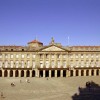Government and institutions
Santiago de Compostela is the capital of Galicia and the seat of the executive and the legislature of this autonomous Spanish region, namely the Xunta de Galicia and the Galician Parliament, respectively. The city also has its own government body Santiago de Compostela City Council.
After the 1978 Spanish Constitution recognised Galicia 's rights as a historical nationality, in December 1980 the Galician people approved by referendum the Autonomy Statute, whose Article 9 attributes the region's government to the President, Parliament and the Xunta de Galicia.
Since 1981, the Parliament has been the maximum organ representing the Galician people; its 75 members are chosen every 4 years. Its powers include legislative authority, control over the Xunta de Galicia's executive activity and approval of the autonomous region's budget. It is located in Compostela's Rúa do Hórreo.
The Xunta de Galicia , for its part, is defined in the Autonomy Statute as the Galician Government's collegial entity, which is accountable, politically speaking, to Parliament. It is made up of the president (designated by Parliament), vice-presidents and “conselleiros” (regional ministers), designated by the president to undertake the administrative functions transferred to the region, in the fields of finance, justice, health, education, industry and trade, rural development, fishing and maritime affairs, family, social affairs and employment, emigration, culture and tourism.
Finally, the city is governed by Santiago City Council , whose 25 councillors, including the mayor, have been democratically elected since 1979, in local elections that take place every 4 years. The town hall is called Palacio de Raxoi, opposite the Cathedral.
The City Council's departments, autonomous organisms and municipal companies provide a wide variety of citizen services, ranging from water supply and rubbish collection to city transport and the city's tourist promotion. Other fields of municipal responsibility include tax collection, traffic, public safety, town planning and rehabilitation, neighbourhood relations, public health and consumption, economic promotion, environment, education, sports and youth, festivals, culture, linguistic normalisation and social welfare, etc.












